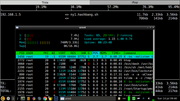It can be trivial to elevate from spot to root. Best IMO to not rely upon running as spot as being secure. Instead look to keep a 'clean' version of the system and browser and boot/use that to go directly to your company web site, nowhere else before or after as that way even when running as root with older software that is pretty secure/safe.I have to use Firefox, when I transfer my age pension to my self I use a XXXX company and their web site does not work with Seamonkey.
Ideally that means booting from a DVD or USB. If you use the multi-session save method then you can initially boot that, configure it as you like preferably keeping any online activity during that set up stage to a minimum, install firefox, create the save and then put that dvd/usb aside for your 'banking' activities i.e. boot it, do your online banking and shut down afterwards without saving. To prevent system auto saving, set the Event Managers Save Session Interval to a value of zero (Control Panel, Desktop tab, FatDog64 Event Manager, RAM save interval).
I boot such a usb as my daily workhorse. See the link in my signature below. From a security perspective Fatdog is the leader of the Puppy's, but security is a process not a product so you have to use it the correct way.


